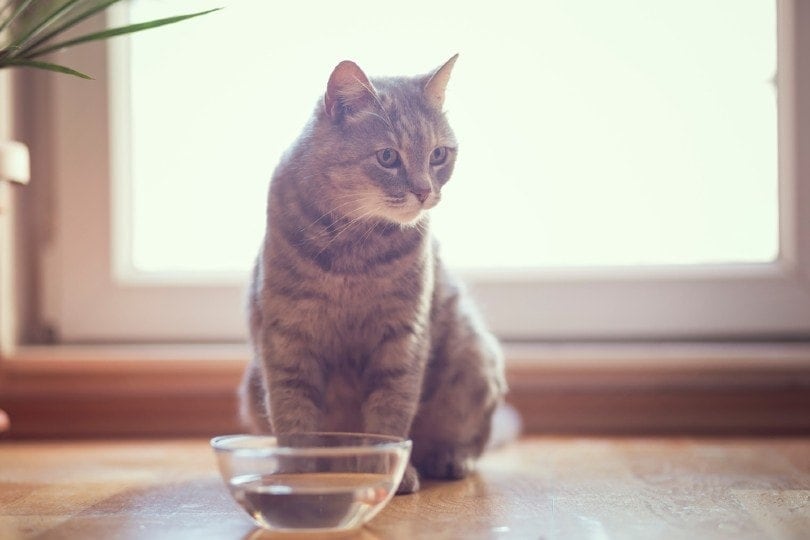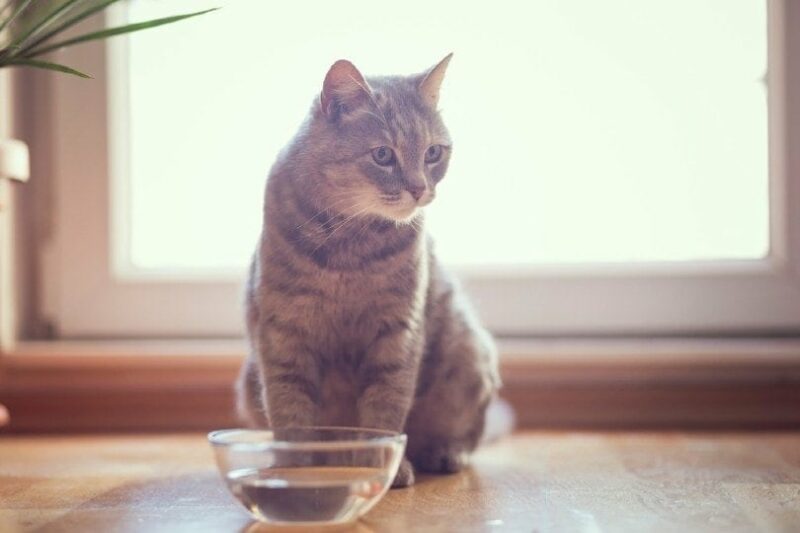If you are a cat owner, you know that they love their treats and will magically appear whenever a treat bag rattles. They can also get quite vocal and demanding of your attention when it’s time for dinner! However, they don’t always seem to care about drinking water, which can be concerning for their owners. If you are experiencing this with your pet, keep reading for several tips and tricks that you can follow to get your cat to drink more water.
How to Get Your Cat to Drink More Water
1. Rule Out Medical Issues
Before attempting to increase your cat’s hydration levels, it’s very important to consult with your veterinarian to ascertain if your cat is indeed dehydrated and to make sure there are no underlying health issues which are the reason why your cat isn’t drinking enough water. This is very important, as some ailments cannot be fixed by encouraging more water intake. Other ailments might actually result in your cat drinking more water than usual, and also require medical attention. If your cat recovers from such ailments, you might be concerned that they aren’t drinking enough water, when in fact, they’re just reverting back to drinking normal amounts of water. Therefore, a veterinarian’s input is absolutely warranted if you think your cat isn’t drinking enough water.
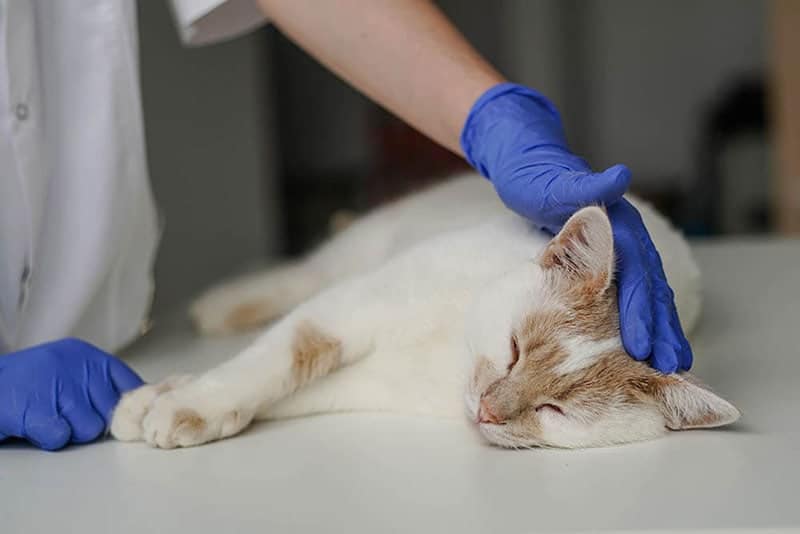
2. Fresh Water
While it may seem obvious, one good way to get your cat to drink more is to provide them with fresh, clean water. Cats are notoriously picky and will usually ignore water if it has been sitting, even for a short time, and filling their bowl with fresh water can convince them to drink it.
3. Multiple Water Sources
Place water bowls in different locations throughout your home, making it more convenient for your cat to find water. The more sources there are, the more likely your cat will drink from one. They might even have a favorite spot where they prefer to drink.
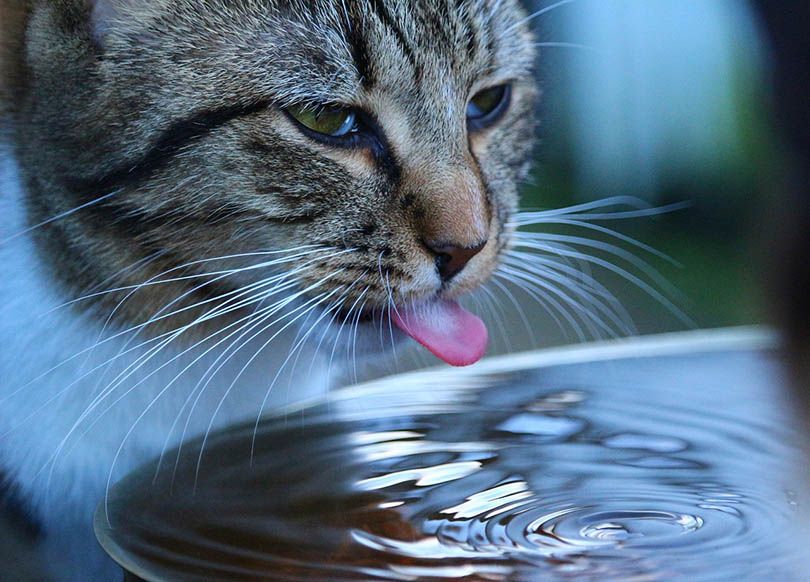
4. Water Bowl Placement
Position water bowls away from litter boxes and sleeping areas, as cats prefer separate spaces for each activity. It’s also possible that a litter box can contaminate the water if it’s too close. If you can’t put each in a separate room, try to keep at least 10 feet between them.
5. Wide and Shallow Bowls
Cats often prefer wide and shallow water (and food) bowls, as these prevent their sensitive whiskers from touching the sides. Look for one at least 5 inches wide for best results.
- NO MESS - The 360° tray on this cat food and water bowl set has a raised design to catch and...
- WHISKER FRIENDLY - Shallow and wide metal containers with flat bottoms ensure your kitty can enjoy...
- CHEW-SAFE MATERIALS - Kittens and cats love chewing on silicone and soft rubber - but it's a choking...
Choosing the right food and water bowls for our feline companions can pose certain challenges for pet owners. The Hepper NomNom Cat Bowl provides a chic and innovative solution that supports cat specific needs, such as shallow bowls and a subtle elevation that fosters whisker relief, posture comfort, and improves digestion. It features an elegant contemporary design with a wide wrap-around tray aimed at minimizing any messes from ending up on your floor! Furthermore, this bowl is entirely dishwasher safe, so pet owners are able to spend more time with their cats instead of cleaning up after them. Discover why the Hepper NomNom Cat Bowl is right for both you and your kitty by clicking here.
At Catster, we’ve admired Hepper for many years and decided to take a controlling ownership interest so that we could benefit from the outstanding designs of this cool cat company!
6. Ceramic or Stainless-Steel Bowls
Choose bowls made of ceramic or stainless steel instead of plastic. Some cats may be sensitive to the smell or taste of plastic, which might prevent them from drinking as much as they should. Plastic bowls are also the main cause of cat acne. You might also need to worry about harmful chemicals leaching into the water when you use certain types of plastic, which can harm your pet.
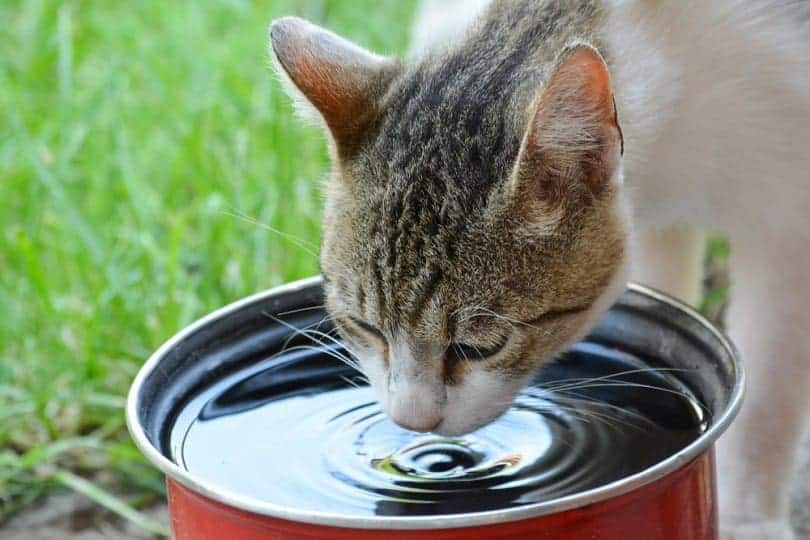
7. Raised Bowls
Raising the bowl off the floor an inch or two can make a big difference for some cats, and it could result in them drinking more water. You can simply place the bowl on a book or stand, or purchase a raised bowl stand for more stability.
8. Water Fountain
A water fountain is one of the most effective ways to get your cat to drink water. The sound of it running can attract your pet, which naturally leads to more drinking, and the constant cycling helps the water stay clean and fresh. Cats are naturally inquisitive and usually drawn to the flow of water from a fountain.
9. Running Water
If you don’t have a water fountain, provide a dripping water source, such as a dripping faucet or a pet-specific dripper, just for a few minutes when they are in the area to try to get them to drink. Many cat owners find that their pet will jump up on the sink to drink from the faucet, and it can be a good way to get your cat to drink more. However, if you’re not sure about the water quality from your faucet, you shouldn’t allow your cat to drink from it. As a rule of thumb, if you wouldn’t drink from a faucet, your cat shouldn’t either.
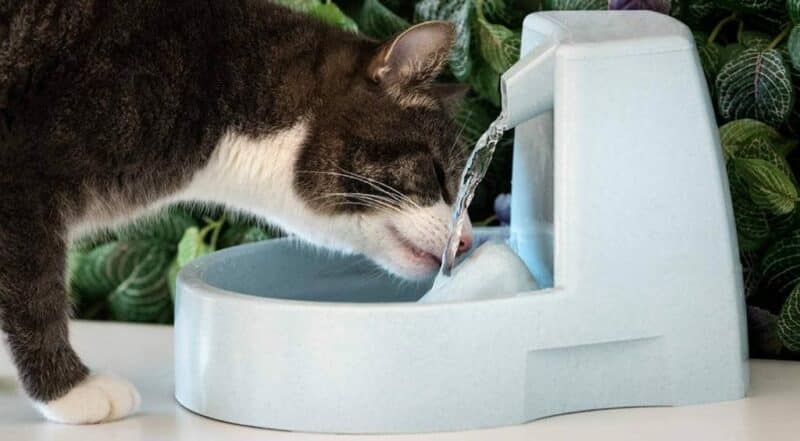
- Related Read: Best Water Bowl for Cats – Our Top Picks!
10. Food Toppers
Add a small amount of cat-safe animal-based broth to your cat’s water to make it more appealing. Ensure that the broth doesn’t contain any harmful ingredients like onions or garlic, or use cat-safe gravies. These toppers can encourage better hydration, but you must ensure that they don’t go over their daily calorie limit.
11. Wet Food
Incorporate wet cat food into your cat’s diet. The moisture content can contribute to overall hydration, and it can be a great way to get your cat to drink more water. However, you will need to watch the calories that your cat consumes so they don’t gain weight. It’s best to follow feeding guidelines on any wet food you plan to incorporate into your cat’s diet. In addition, any dietary transitions should be slow and done over a period of about 2 weeks. It’s best to consult with your vet before incorporating a new type of food into your cat’s meals.
12. High-Moisture Treats
Offer high-moisture treats like pieces of cooked chicken or lamb in water to encourage your cat to consume more liquids. You will have to watch the calories to ensure that your cat doesn’t overfeed; treats should only comprise about 5 – 10% of your cat’s daily calories.
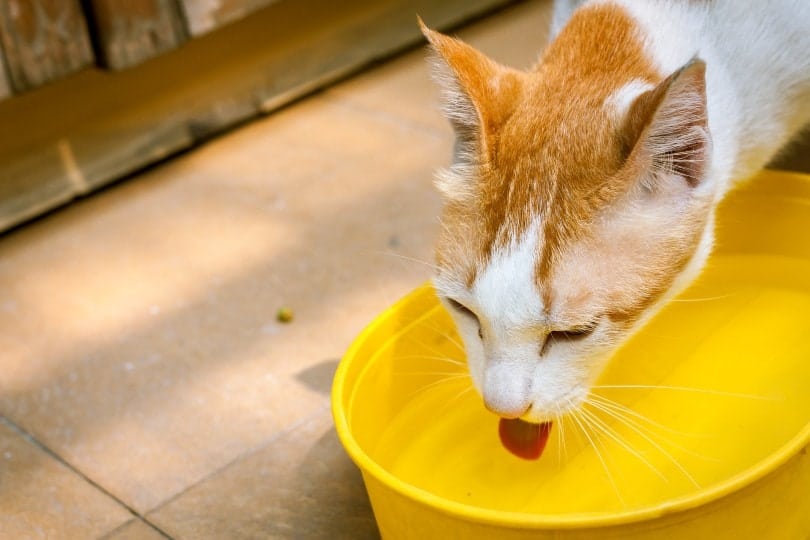
13. Water Temperature
Cats may prefer slightly cool water. For such cats, ensure that the water is not too cold, but also avoid serving it at room temperature if possible. Adjust the temperature based on your cat’s preference. Other cats are fine with room temperature water.
14. Syringe Feeding Water
Finally, in some instances, it might be necessary to syringe feed your cat some water to ensure they are hydrated. This should only be done after a consultation with your veterinarian. Your veterinarian can also demonstrate how to properly syringe feed your cat some water. This is often usually done as part of a recovery process (from a condition or ailment) for certain cats. It is also required for some cats that are on specific medications.

Summary
A cat refusing to drink water is worrying, and such cats need veterinary attention to ensure they aren’t suffering from an underlying disease or ailment. If your cat is deemed problem-free by a vet, there are certain tricks you can use to get them to hydrate more. Purchasing a water fountain is likely your best bet. This device keeps the water circulating and filtered, making it more appealing to your cat and safe to drink as well. The sound will also attract your cat, which will encourage them to spend more time at the fountain. If you want to stick with a bowl, make sure it is wide enough, and try one made of stainless steel or ceramic instead of plastic. We’ve also discussed other tips and tricks in this article which will hopefully get your kitty drinking more and providing you with peace of mind.
Featured Image Credit: Impact Photography, Shutterstock
Contents
- How to Get Your Cat to Drink More Water
- 1. Rule Out Medical Issues
- 2. Fresh Water
- 3. Multiple Water Sources
- 4. Water Bowl Placement
- 5. Wide and Shallow Bowls
- 6. Ceramic or Stainless-Steel Bowls
- 7. Raised Bowls
- 8. Water Fountain
- 9. Running Water
- 10. Food Toppers
- 11. Wet Food
- 12. High-Moisture Treats
- 13. Water Temperature
- 14. Syringe Feeding Water
- Summary

